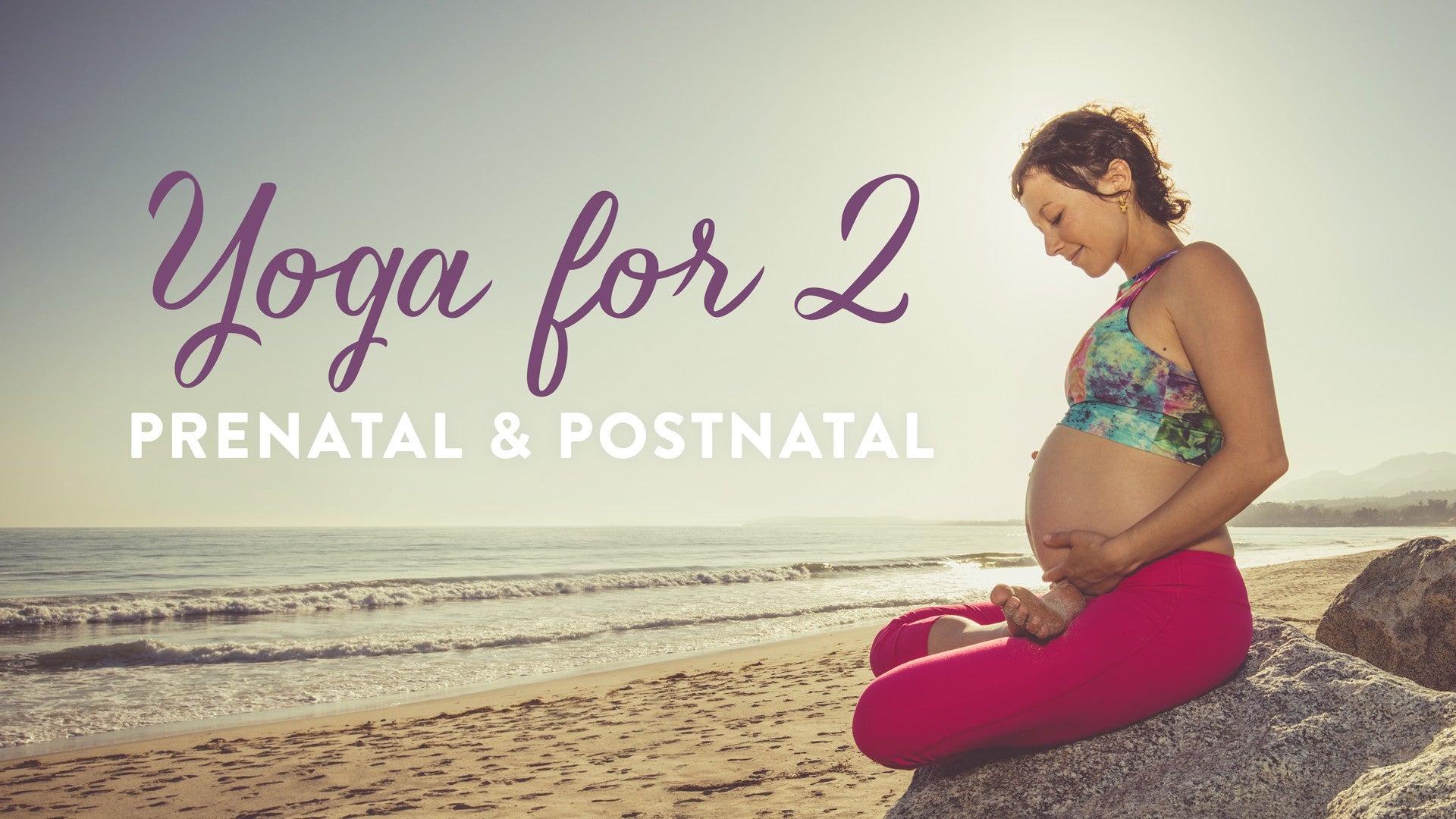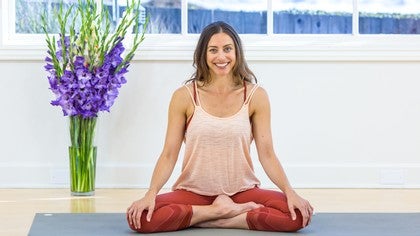Description
About This Video
Transcript
Read Full Transcript
Welcome. So I really wanted to take a bit of time just to talk about self-care and the postpartum period. I come from a background of Chinese medicine. I'm an acupuncturist and an herbalist. And I work with a lot of women who have been pregnant, are trying to get pregnant, and then of course afterwards are rehabbing their bodies after pregnancy and childbirth. And of course I have my own experience now having had a child. There's a few things I see happen and I experienced. One is the baby is born and all of your attention is on the child and on your duties in life. Especially in our culture, this Western culture, there's such a rush to get back to work. There's such a rush to get back to cooking for yourself, cleaning. In Eastern culture, it's much more community based. So the mother, the grandmother, the aunts, all the women in the community come together and they help each other out. And unfortunately our culture isn't built like that. We have just our small families, our family unit. A lot of times we don't even live close to our grandparents, parents, aunts, uncles. And there's also a much bigger age gap now. So women are having children later on in life, whereas before in teenage years and early 20s, women were having children. So mothers and grandmothers were much more closer to their own experience. And what that means is that there's a lot more pressure on moms today and we don't have as much support as we did. And it really does take a community to raise these children. It can't all be on you. We want to ask for help when it's needed so that we can take care of ourselves. And also the child can then get help from other people, dads, aunts, uncles, nannies. And we get time so that we can show up at our best for our children. If we're taking care of ourselves and we're able to hydrate, to eat well, to meditate, to exercise, all of these things affect our experiences and affect our nervous system. And if our nervous system is calm, cool, collected, relaxed, then the baby will feel that and the baby's nervous system will then be able to settle and be calm, cool, collected, relaxed. There's a practice in Chinese medicine of sitting for 40 days after childbirth. And that time period, those first 40 days, we call it now the fourth trimester, it's really a time where the baby is still transitioning and their nervous system is adjusting to being in the world. You may have noticed in your own child that their nervous system just can't handle all the street noises or can't handle being in restaurants. And I understand every baby is different so maybe your child is fine. But a lot of them are not. A lot of them, it's too much for their nervous systems. Likewise for mother's nervous systems, you're very, very fragile after childbirth because you're so in tune with what's happening with your child. Every single sound they make, every emotion that they experience, you feel. It's also such a fragile time because your body is depleted. It's depleted from carrying a child for ten months, nine months, nine to ten months depending on when you gave birth and then depleted from childbirth. And some women have very easy childbirths and some have very traumatic ones. And you know what your childbirth experience was and it's really important that you take the time to yourself to heal from that experience, whatever it was, or to celebrate it. It's a huge transition. I remember coming home from the hospital and I had this baby in my arms who's crying and I'm myself healing. Luckily my mom did come into town to help me out. I just remember thinking it is a miracle that anyone makes it through alive. It's really a miracle, mama or child. And that as many people make it through alive because no one teaches us how to take care of a baby. No one teaches us how to take care of ourselves. The communication isn't there except for crying and screaming and that could mean anything.
And you're so exhausted. It's really just amazing. It's all amazing. And so those first six weeks for me were like the steepest learning curve of anything I've ever done in my life. It's learning this new being. It's a whole identity change because I've known myself to be Maria, the yoga instructor who practices regularly, practices Chinese medicine, is a wife, is a daughter, is an aunt. I had all of these roles in my life and now all of a sudden I was none of those things. I was just a mom. And relearning who I am was a shock. It was like what used to be my normal morning ritual was waking up, drinking some tea and getting on my yoga mat was now waking up to a baby who right away needed me. So everything that I did to center myself, to connect with God and to come to peace was no longer an option. So I had to find new ways of doing that with a baby. And so connecting with my child was my new practice. It was waking up. So what if I didn't brush my teeth? So what if I never got dressed that day? I didn't take a shower. I didn't run the errands I needed to. It really got to a point where there would be all of these lists of things that I needed to do. And at the end of the day, the only thing I did was take care of my child. And that was fine. That was the transition period. It was learning her needs and then learning my own. But at some point I had to make some transitions. I had to learn how to then take care of myself and start bringing back in yoga, bringing back in meditation, bringing back in cooking, cleaning, going back to work. And one of the ways that I did that and this worked for me was just asking for help from my husband. I really asked him to let me go back to work early so that he could start to learn how to be a dad. And I would first just go back for two to four hours. And that was like a slow weaning process where I was going to leave him with breast milk that I had pumped for two to four hours to take care of the baby. And then he, I would know, he could call me, he could text me. Luckily I was only 15 blocks away. And if he needed me, I was there and I could get home really quickly. And then I slowly built that up. And it was amazing because he got to step into a role as a dad and they were able to develop their connection. And I was also able to wean myself off of the baby because what I realized is the baby is attached to the mama, but I was equally attached to her. And that's okay. It's natural. It's normal. But I also had to start to realize that I wasn't the only one that could take care of her. There were lots of other people who loved her and that she had things to learn from in interacting with other people. Proper nutrition is so important postpartum.
More important than getting dressed in the morning. One thing that I see in a lot of my mothers who come to see me in clinic is that they right away get off of their prenatals and their DHA. And keep in mind, you've lost a lot of blood through childbirth. So staying on your prenatals is important because it keeps you nourished with iron and B vitamins and helps you to rebuild your blood. Furthermore, your baby, if you are nursing, is going to be pulling more nutrients out of you and they're getting all of their nutrition from you. So the DHA and the prenatals will help support you so that you can support the baby. Foods that are very easy to digest are helpful. So maybe steamed vegetables as opposed to raw steamed whole grains or cooked grains are really good. Keeping things very simple, easy to digest, bone broth, soups is really helpful. Your digestion, you may notice changes right after pregnancy, after childbirth. And then also not being in a rush to get back to your exercise routines. One of the things I think that surprises women the most after childbirth is that for a couple months, you may still look pregnant. You're still holding on to a lot of fluids that are draining. Your uterus hasn't gone back to its normal size and your body actually needs some of that extra fat for breastfeeding. So rushing to get back into your old clothes or to get into the gym is really unnatural. Take your time. You're doing so much for everyone else, for your family, for your child that to then make your identity about everyone else, how you appear to the world is really unfair to yourself. Give yourself time, be gentle and let yourself eat really well, rest really well. If you don't, it just takes that much more time for your hormones to come into balance. You don't have the nourishment to make the hormones that you need. You don't have the rest to allow your adrenals to recover. All of that cyclically will just one piece at a time start to deteriorate your body, your well-being. So if you really take the time to get the proper rest, the proper nourishment and let things kind of unfold naturally, start with baby steps, maybe walking, maybe doing a little bit of gentle yoga, you're going to see much better results all around. So a lot of people talk about mama brain or pregnancy brain. And recently I read an article, it was about a study that was published and what they did is they actually looked at the brain of mothers and they realized that it's not that moms lose brain function or have early onset dementia. You're using the brain differently. So whereas before the world that we live in is very structured and logical, once you're a mother, your intuition becomes the most important aspect because that is what's going to allow you to respond to your child and know what your child's needs are. So you become much more intuitive and creative and that part of the brain actually is much more developed and stronger and your logic and maybe your reasoning and memory are not as strong because you don't need it. So it's not that your brain doesn't work anymore. Your body is doing exactly what it needs to at this time. Your brain is doing what it needs to at this time. So the female body in this whole process is just miraculous and everything that you need right now you have.
So we can be really grateful for that. One of the things that is so important during this time is to not feel alone, to know that you have other women who have done this before and are doing it right now. We support each other. We've walked down this path. We know this path and we're here for each other. That being said, I'm more than happy to hear from you. I would love to share with you my experiences and I understand that yours may be completely different and something I say may not help you at all but it might help you. And so please reach out to me on the forum if you have questions or just feel like you need to connect. And I hope that you enjoy the practices that are here and I wish you the best on this beautiful time in your life.
Yoga for 2: Prenatal and Postnatal: Active Postnatal
Comments
You need to be a subscriber to post a comment.
Please Log In or Create an Account to start your free trial.









